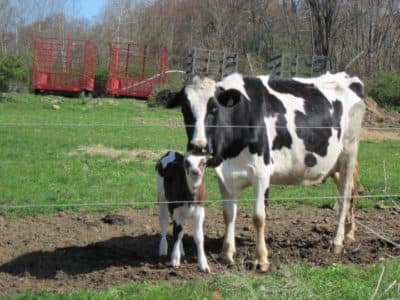Advertisement
Raw Milk Enthusiasts Sour On Proposed Delivery Ban

How much do you expect to pay for a gallon of milk these days? $2.50?
Well, if it came from the cows here on Robinson Farm, a gallon is going to cost you $7. But for a small but growing number of people in Massachusetts, it's worth it.
People like Dara Lambert of Upton. She's what you might call a raw milk enthusiast. "I believe pasteurization pretty much kills a lot of the nutrients: the probiotics, the antibiotics," she says. "I drank raw milk while I was breast feeding, I would drink it if I was pregnant."
Lambert has just pulled up at Robinson Farm, where she has come to pick up some fresh, raw milk. Several dozen gallons actually, more than you'd think even the most hardcore raw milk drinker might need.
She belongs to what is known as a buying club. Since it's illegal to sell raw milk at the supermarket, the only place consumers can get it is straight from the farm. But for most people, getting to one of the state's 20-some farms that sell raw milk is not easy.
Which is why a loose network of these buying clubs have emerged. Club members take turns driving to a farm to pick up milk for the rest of the group. For somebody living in Brookline — where there is a buying club, by the way — it means only having to make the drive out to Central Massachusetts every few months, rather than every couple weeks.
But, now, those buying clubs are in danger of being shut down. The state Department of Agricultural Resources holds a hearing Monday morning in Boston on its push to make the clubs illegal.
Department of Agricultural Resources Commissioner Scott Soares says the problem is not the raw milk itself, it's that these clubs are unregulated.
"Milk is a pretty unique product and as a result of that, there are some pretty specific requirements around the distribution of milk," he says. "None of these businesses had pursued any kind of legal activity. That's why the department has engaged and has issued cease-and-desist orders to businesses that in fact were engaged as milk distributors for raw milk that were in fact unlicensed activities."
Advertisement
Back in Hardwick, at Robinson Farm, owners Ray and Pam worry a ban on buying clubs could mean the end of the family business.
Raw milk has been their main source of income since they they transitioned five years ago to become a smaller, organic dairy farm. And about half their raw milk sales come through the buying clubs.
"Whenever we started selling raw milk, it was the groups that made it a real business — a real successful, sustainable business," Ray says. "So it would be real difficult to lose them right now."
This program aired on May 10, 2010.